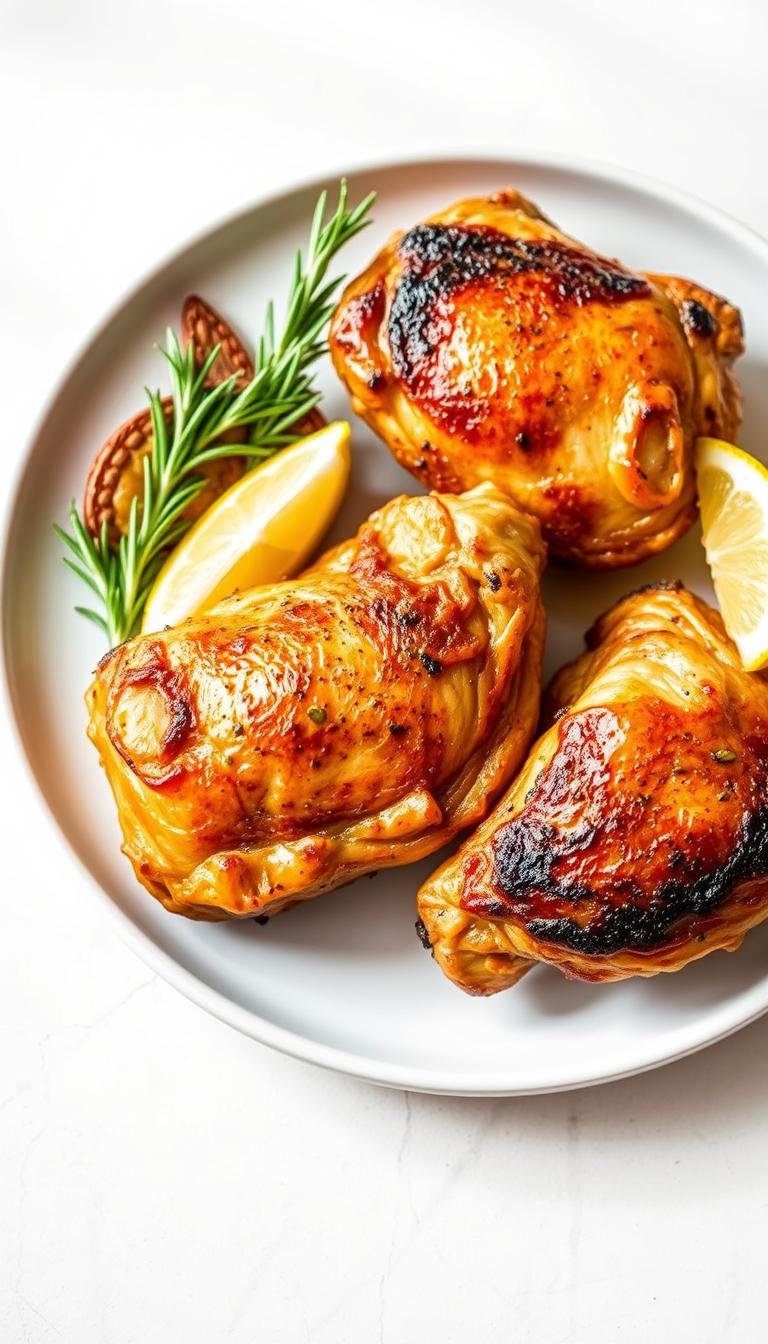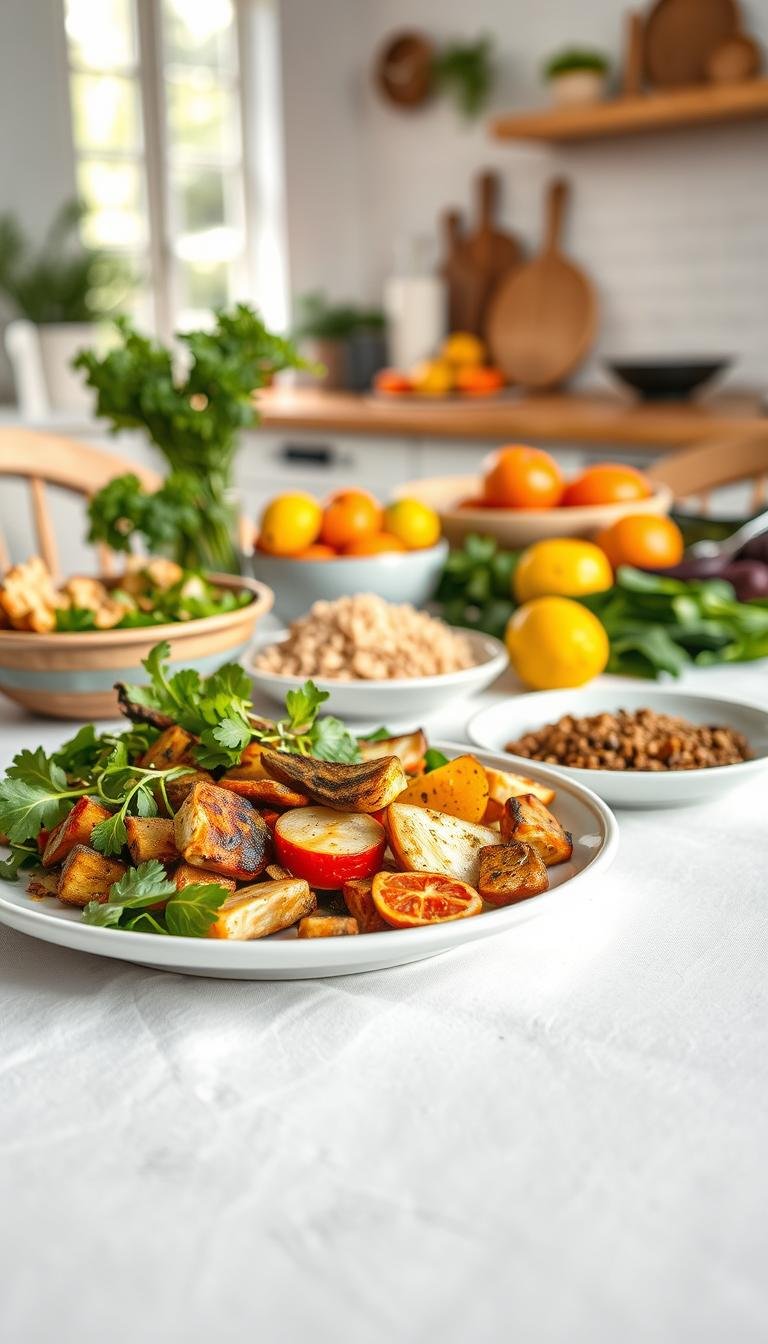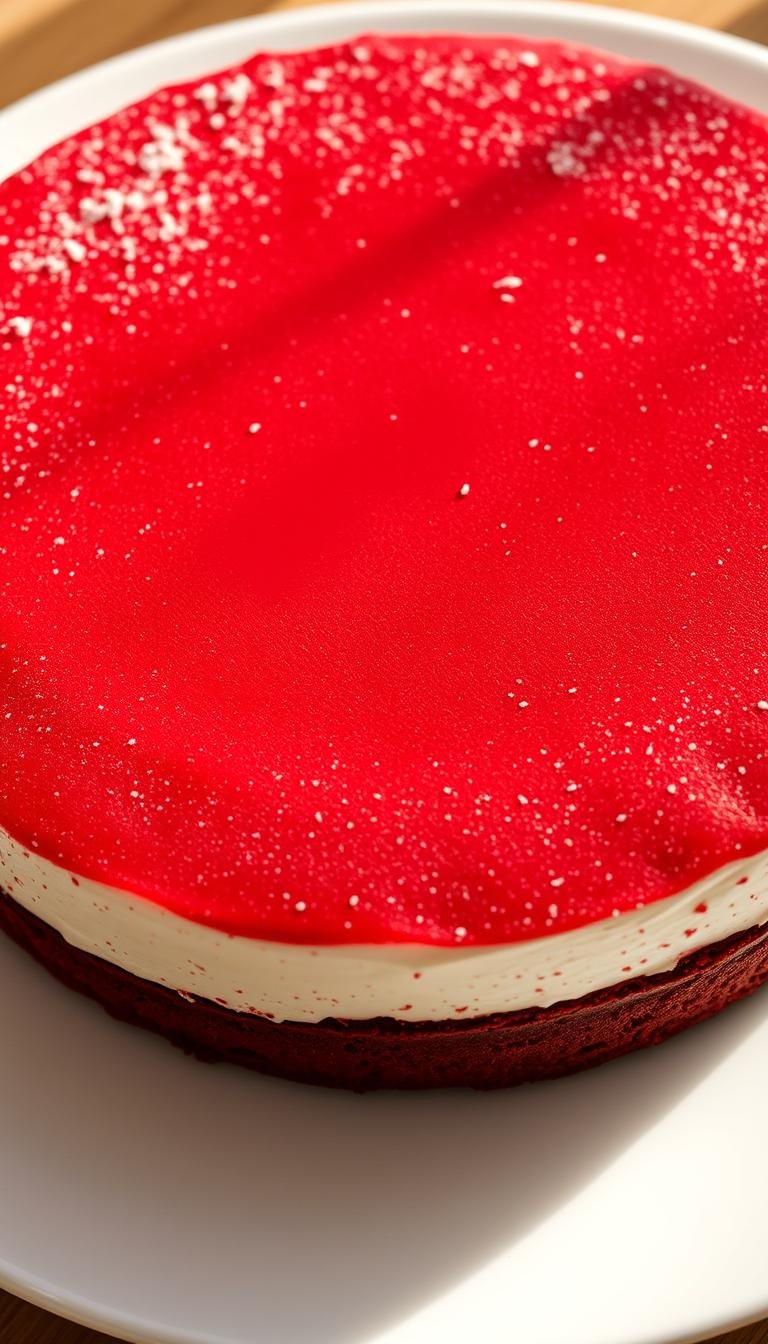Easy and Healthy Chicken Thigh Recipes to Try Today
Surprising fact: Americans cook more than 500 million weeknight meals with thighs each year, showing how much cooks rely on this cut for quick dinners.
The roundup that follows proves why thighs shine for fast, flavorful meals. You’ll see three core methods: a bright cilantro-lime skillet, a spice-rubbed 400°F bake, and a rustic sheet pan with root vegetables.
Each approach keeps things simple — short marinades, pantry spices like paprika and cumin, and a clear target: 165°F for safe, juicy results. Tips for marinating, oven timing, and gentle reheating are included so leftovers stay tender.
Pick the technique that fits your time tonight, then rotate the others into your weeknight meal plan. Expect practical steps, flavor swaps, and storage guidance to make dinner easier and more satisfying.
Key Takeaways
- Three go-to methods: skillet, 400°F oven bake, and sheet pan roast.
- Simple pantry spices and citrus create big flavor with little fuss.
- Cook to an internal temperature of 165°F for safe, consistent results.
- Marinate briefly or overnight and store leftovers 3–4 days or freeze up to 3 months.
- Choose a method that matches your time and rotate for weeknight variety.
Why healthy chicken thigh recipes make the perfect weeknight dinner
When time is tight, choosing a naturally juicy cut lets you focus on flavor, not precision.
Boneless, skinless chicken thighs stay forgiving on the stove or in the oven, so they remain tender even if you step away for a few minutes. A 4-ounce oven-baked portion runs about 254 calories and gives roughly 26 g protein and 15 g fat, which helps keep evening plates satisfying.
Bone-in, skin-on cuts add another layer: the rendered fat bastes root vegetables during a 50–55 minute roast at 400°F, boosting savory flavor and texture.
- Versatile timing: quick sears, 30-minute bakes, or hands-off sheet-pan options that fit a busy hour.
- Flavor-friendly: darker meat pairs well with bold spices, citrus, and herbs for repeatable family favorites.
- Weeknight wins: affordable, easy to scale, and often becomes a favorite chicken pick with minimal fuss.
Use an instant-read thermometer to hit 165°F and pick the method that matches your evening schedule.
Quick-start: ingredients, tools, and time-saving prep
Gather a few pantry basics and a couple of trusty tools, and weeknight dinner becomes a ten-minute assembly instead of a chore. Keep a short list of ingredients on hand so each step is fast and predictable.
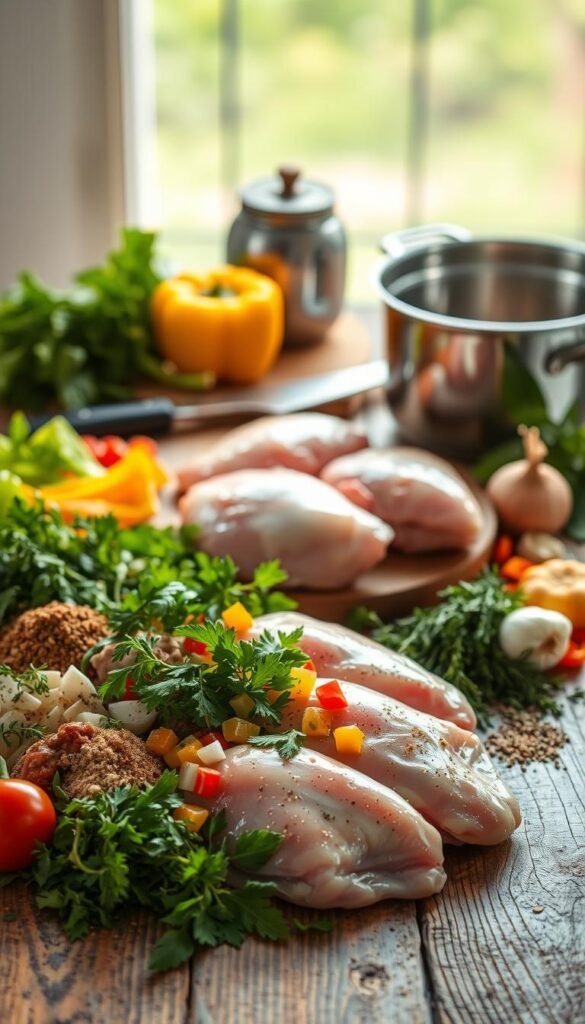
Pantry staples
Stock: olive oil, garlic powder, paprika, Italian seasoning, kosher salt, and black pepper. Add cumin, smoked paprika, and onion powder for the oven rub.
Essential tools
Have a large bowl and whisk ready for marinades. A cast iron or non-stick pan sears well; a sheet pan or 9×13 dish handles roasting. An instant-read thermometer confirms 165°F without guesswork.
- Measure spices with a teaspoon for consistent results.
- Batch the prep: portion seasonings into a small bowl, pre-chop herbs, and set oil nearby.
- For quick flavor, marinate 15 minutes at room temp or up to 2 hours in the fridge before cooking.
- Toss root vegetables in oil on the pan to cut dishes and help caramelize.
Prep smart and the rest of the cooking steps flow—sear, roast, or sheet-pan bake with confidence.
Cilantro-lime skillet chicken thighs on the stovetop
A bright cilantro-lime marinade turns a quick stovetop sear into a weeknight showstopper.
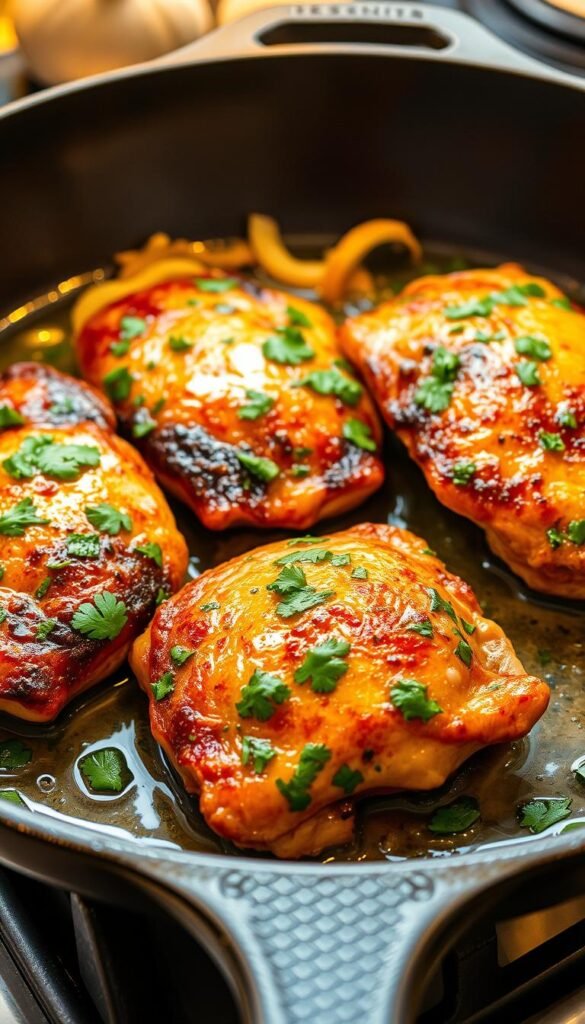
Fresh marinade: Whisk 3 tablespoons olive oil, the juice of 2 limes, 1/3 cup chopped cilantro, 3 cloves minced garlic, 1/2 teaspoon cumin, 1/2 teaspoon paprika, a pinch of red pepper flakes, and a little salt and black pepper. Coat 2 lb boneless, skinless chicken thighs and let sit.
Marinate smart: 15 minutes on the counter gives a bright lift; up to 2 hours in the fridge deepens flavor. Short marination saves time and still adds punch.
Hot pan technique
Heat a skillet over medium-high until it sizzles. Add about 1 teaspoon of oil and place thighs in the pan without overcrowding. Let each piece sear undisturbed for 5–6 minutes per side to build a crust.
Use an instant-read thermometer and pull the meat at 165°F in the thickest part. Avoid moving pieces early so the surface browns and stays flavorful.
“Preheat the pan until you hear a clear sizzle—it’s the quickest way to a crisp exterior.”
Finish and serve
Finish with a fresh squeeze of lime and extra chopped cilantro on top. Serve alongside a simple salad or greens to balance the plate.
| Step | Action | Approx. time |
|---|---|---|
| Marinate | Coat thighs in cilantro-lime mix | 15 minutes–2 hours (fridge) |
| Sear | Hot skillet, 1 teaspoon oil, do not overcrowd | 5–6 minutes per side |
| Check | Use thermometer to reach safe temp | Pull at 165°F |
| Finish | Lime squeeze, chopped cilantro, serve with salad | 1–2 minutes |
Oven-baked spice-rub chicken thighs at 400°F
A quick oven roast at 400°F brings bold spice and hands-off convenience to weeknight dinner.
In a large bowl, coat boneless, skinless pieces with olive oil, kosher salt, black pepper, garlic powder, onion powder, smoked paprika, cumin, and a pinch of cayenne. Toss until each piece is well covered.
Preheat the oven to 400°F and arrange the meat in a single layer in a rimmed 9×13-inch baking dish. Brush any remaining oil-spice mix over the top for even color.
Timing and finish
Bake uncovered for about 30 minutes. Check the thickest piece with an instant-read thermometer and pull when it reaches 165°F. Smaller pieces may finish a few minutes earlier.
Flavor swaps and storage
Short on time? Spray with olive oil and use 1 tablespoon Italian seasoning plus kosher salt for a simple shortcut. For richer notes, swap melted butter or ghee for the oil.
- Pairing tip: Roast vegetables on a separate sheet or the same oven so everything finishes at 400°F.
- Leftovers: Refrigerate 3–4 days or freeze up to 3 months. Reheat gently at 350°F to keep juiciness.
Simple rub. High heat. Minimal fuss.
Sheet pan chicken thighs with roasted root vegetables
One-tray roasting concentrates savory juices and produces crisp skin while vegetables roast underneath. Preheat the oven to 400°F. Line a sheet pan with foil or parchment for easy cleanup.
Build the sheet: Toss halved baby potatoes, chunks of rutabaga, parsnip, carrots, and a halved onion with about 2 tablespoons olive oil. Add generous pinches of salt and pepper and roughly 2 teaspoons of a seasoning blend made from Italian seasoning, granulated garlic, granulated onion, and paprika.
Season and nestle
Pat skin-on, bone-in thighs dry. Rub the remaining blend over the top and drizzle a little olive oil. Nestle each piece skin-side up over the vegetables so drippings baste the bed below.
Roast to crisp and tender
Roast in the preheated oven for 50–55 minutes. Aim for deeply browned skin and fork-tender potatoes. Check the thickest part for 165°F with an instant-read thermometer.
Finish: Brush a light drizzle of olive oil over the tray and scatter fresh thyme or rosemary on top before serving. This pan method makes a complete side and main with one simple roast.
| Component | Amount | Oven | Time |
|---|---|---|---|
| Root vegetables | 2–3 cups mixed (potato, carrot, parsnip, rutabaga) | 400°F | 50–55 minutes |
| Onion | 1 large, halved | 400°F | 50–55 minutes |
| Skin-on thighs | 4–6 pieces, seasoned | 400°F | 50–55 minutes (to 165°F) |
Tips, nutrition, and serving ideas for a balanced, flavorful meal
Simple timing and smart swaps make dinner balanced, flavorful, and fast. Use a thermometer and clear portion targets so the main protein stays juicy and safe.
Cooking cues
Pull at 165°F with an instant-read tool to avoid overcooking. Let pieces rest briefly so juices redistribute.
Manage rendered fat by elevating meat on a rack or over vegetables to promote even crisping.
Make-ahead and storage
Refrigerate cooled leftovers in airtight containers for 3–4 days or freeze up to 3 months. Thaw overnight in the fridge.
Reheat gently—350°F oven or 50% microwave power—so texture stays tender and avoids dryness.
Sides that sync
- Pair with a peppery arugula or spinach salad for freshness.
- Roasted sheet-pan vegetables or sautéed mushrooms add depth and color.
- Zucchini noodles make a light, low-carb side that complements richer flavors.
Calories and protein focus
A 4-ounce cooked portion runs about 254 calories with roughly 26 g protein and 15 g fat. Plan portions to match appetite and weeknight time constraints—30 minutes for a quick bake or 50–55 minutes for sheet-pan roasting.
Conclusion
Finish strong: pick one go-to method—stovetop sear, quick oven bake, or a full sheet roast—and you’ll have reliable weeknight wins. Keep a bowl for mixing and a clean landing area for cooked pieces to speed prep.
For oven options, always preheat oven to 400°F and choose a 9×13 baking dish for juiciness or a broad sheet pan for browning and built-in sides. Use olive oil, garlic, and a sprinkle of Italian seasoning or smoked spices to shift flavors fast.
Small touches lift the plate: a squeeze of citrus on top, a light drizzle of olive oil, or fresh herbs. Rotate these methods and you’ll have a simple, go-to favorite chicken framework that works any night.
